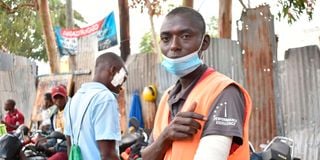Kisauni gang: Our attacks in Mombasa are 'practical interviews' for new members

Mr Leonard Kai, a boda boda rider, points to the injury he sustained after he was attacked by suspected members of the Wakali Kwanza gang in May 2021.
Hesitation. That is how I felt when I approached one of the residents of Kisauni to show me around.
Earlier, while seated in a tuk-tuk from Mombasa town heading to Kisauni, I felt discomfort in my chest. I was sweaty and dizzy. Why? I was not sure whether I would come out another victim of the panga-wielding gang. I had been warned several times not to do this.
Kisauni residents know each other pretty well. Every time they passed me along the way, they would stare.
I meet Abdallah Abdulrahman, an area community policing officer with an old man whose head has scars. He says he suffered the head injury one evening when the panga-wielding gang invaded his shop.
“I have lived here my whole life. If I say I move out, where will I go? Where?” the old man asks.
Abdallah says the criminal gangs menace in the area started in the 1990s.
“By that time Kisauni, was not well known. The places that were leading in insecurity were Mombasa town and Likoni. The gangs would attack and then come here to hide,” he says, noting that others would go as far as Lamu and cross the border into Tanzania.
It is between 2012 and 2013 that Kisauni became infamous, becoming of one of the most dangerous areas in the country.
“Criminal gangs from Nairobi, Lamu and Tanzania would hide in Kisauni. They would also recruit young boys and girls from here,” says Abdallah.
Their numbers would continue to grow, with spikes during the elections as politicians would guarantee them jobs, he says.
“They were hotcakes for politicians. After elections, they would be given different jobs for their loyalty. Back then, they would only focus on stealing things like necklaces and wallets. They were not so much into blood shedding, which has become rampant in recent years, Abdallah says.
While some residents are leaving for fear of their lives, others are, strangely, settling in.
Nowadays, he explains, the politicians abandon the gangs after elections. “They then unleash their anger on the common mwananchi.”
Also Read: Four MPs linked to new gangs
James Kalinga, a caretaker in one of the apartments in the area, says affordable rental houses continue to attract a large number of people.
“It is not like these people do not know Kisauni is unsafe. They are well aware, some have even been victims more than once. But where would you prefer to live, where houses are cheap and spacious or expensive?” he asks.
From Skaba Skuba in the late 60s, Kongo by Force in the late 70s, Kuzacha in the early 80s to Sri Lanka and 40 Brothers in the 90s, criminal gangs continue to grow in the area.
Today there are gangs like Wakali Kwanza,Wakali Wao, Wakali Pesa, Mtu Chee, Wajukuu wa Bibi, 86 battalion, Mau Mau, and Watengwa.
Abdallah says the gangs comprise individuals as young as 12 years of age and as old as 26. And they seem to be highly networked.
“After committing crimes, they are sheltered by their colleagues in different corners of Mombasa County. They can commit crimes in Likoni and be sheltered in Kisauni, or vice versa. We have seen many of them going up to Tanzania, Lamu and Nairobi, then after a short while they resurface,” he says.
One of the gang leaders, who agreed to speak on condition of anonymity, said: “The more useful skills you have, the more advantage you have to be hired. We have dealt with drug lords, land grabbers among many other people. When we carry out an attack, it is like an interview platform where you showcase your skills.”
“Some of our friends end up in other countries. Others join the bigger criminal gangs. For us, it is just about survival,” he adds.
As they “survive”, police have vowed to wipe out the gangs, with Kisauni MP Rashid Bedzimba and area Deputy County Commissioner Jamleck Mbugua issued stern warnings.





